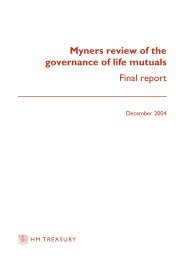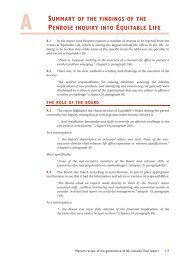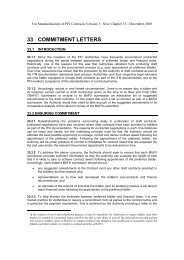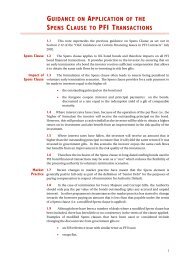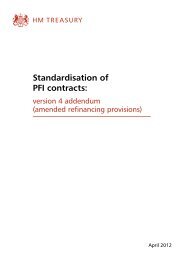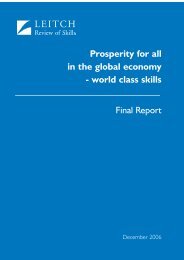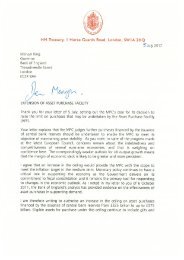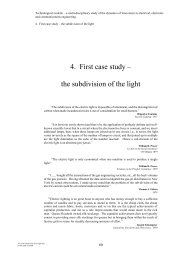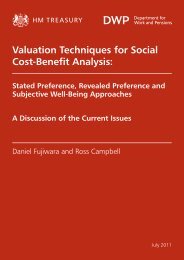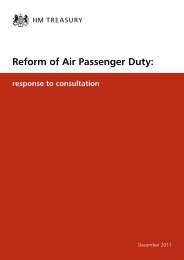Valuing Our Natural Environment Final Report ... - HM Treasury
Valuing Our Natural Environment Final Report ... - HM Treasury
Valuing Our Natural Environment Final Report ... - HM Treasury
Create successful ePaper yourself
Turn your PDF publications into a flip-book with our unique Google optimized e-Paper software.
<strong>Valuing</strong> <strong>Our</strong> <strong>Natural</strong> <strong>Environment</strong> – <strong>Final</strong> <strong>Report</strong> - Annex1<br />
In-depth groups can be considered as being at an intermediate position on a continuum<br />
between short focus groups and full-scale citizens' juries/consensus conferences. Along this<br />
continuum, though the specific methods and data used vary, the basic idea remains group<br />
discussion and deliberation, and the key difference is the amount of time and effort which<br />
participants are asked to contribute.<br />
A1.2.2.5 Data needs<br />
It is typically the case that quite general information concerning the focus group/in-depth<br />
group issues is provided to participants. Normally this tends to be less detailed and<br />
technical than for more in-depth consultative techniques. Primarily, most interest is placed<br />
on information and attitudes the participants ‘bring with them’.<br />
With regard to the provision of information, there is a ‘grey area’ concerning requests from<br />
participants for factual clarification. In particular, should the facilitators (who may not<br />
know much about the topic) or the researchers (who should, but who may not wish to<br />
“bias” the group with their views) be involved in answering questions? Or, alternatively<br />
should the information provided be considered the only external information the<br />
participants should have? Such an issue may be less of a worry for in-depth groups where<br />
verifiable data can be produced at the next meeting, and where there is likely in any case<br />
to be more emphasis on providing information for the participants to discuss and respond<br />
to.<br />
A1.2.2.6 Other practical issues for implementation<br />
The actual focus group/in-depth exercise will usually be up to two hours in duration, or<br />
sometimes a little more with a break for participants. Additionally, in-depth groups will<br />
meet several times, sometimes with several weeks between meetings. From a practical<br />
point of view some organisational work is required (e.g. recruiting participants, scheduling<br />
groups, writing up transcript and analysis). Groups will often have one facilitator and one<br />
assistant tape-recording and taking notes. Transcription and analysis follow the group: the<br />
whole process will typically require at least 5 person-days per group if not more. In-depth<br />
groups clearly have greater organisational requirements, moving along the continuum to<br />
the major undertaking of citizens' juries. In terms of participants, groups will usually have<br />
at least 6 members (plus facilitators) and at most 15 or so. Groups with higher numbers of<br />
participants may be difficult to manage as a single group, and although splitting into subgroups<br />
is possible, this may make it difficult for facilitators to follow the process properly.<br />
A ‘normal’ group will have 8 to 12 members. Participants are generally compensated for<br />
their time, though for single short-session groups (say 2 hours) payment can be small or "in<br />
kind".<br />
A critical issue in running group consultations is the provision of information. A coherent<br />
non-controlling strategy for providing it is needed.<br />
A1.2.2.7 Principal outputs<br />
The unprocessed output of focus groups and in-depth groups will be a transcript of the<br />
discussion. Analysis of the discussion generally involves highlighting key threads, identifying<br />
areas of general agreement, identifying areas of disagreement and conflict, and often<br />
trying to explain the discourses/reasons underlying common views and points of<br />
disagreement. The output can be used to generate key areas for further investigation, for<br />
example via questionnaires (if research driven) or by hearing expert evidence (if part of<br />
participatory deliberation).<br />
A1.2.2.8 Transferability of outputs<br />
Focus groups generally do not aim for statistical representativeness, or to make claims<br />
about individual views, but focus rather on qualitative analysis of how small groups discuss<br />
issues. The transferability of outputs from focus groups and in-depth groups is therefore<br />
difficult to assess but provided a range of “types” of group are held, some general<br />
conclusions on factors influencing the group discourses should be available.<br />
eftec A36<br />
December 2006



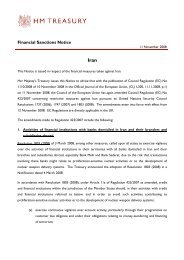
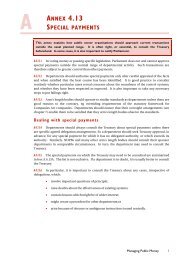
![AIRTO [Professor Dr Brian Blunden] - HM Treasury](https://img.yumpu.com/15492848/1/184x260/airto-professor-dr-brian-blunden-hm-treasury.jpg?quality=85)
